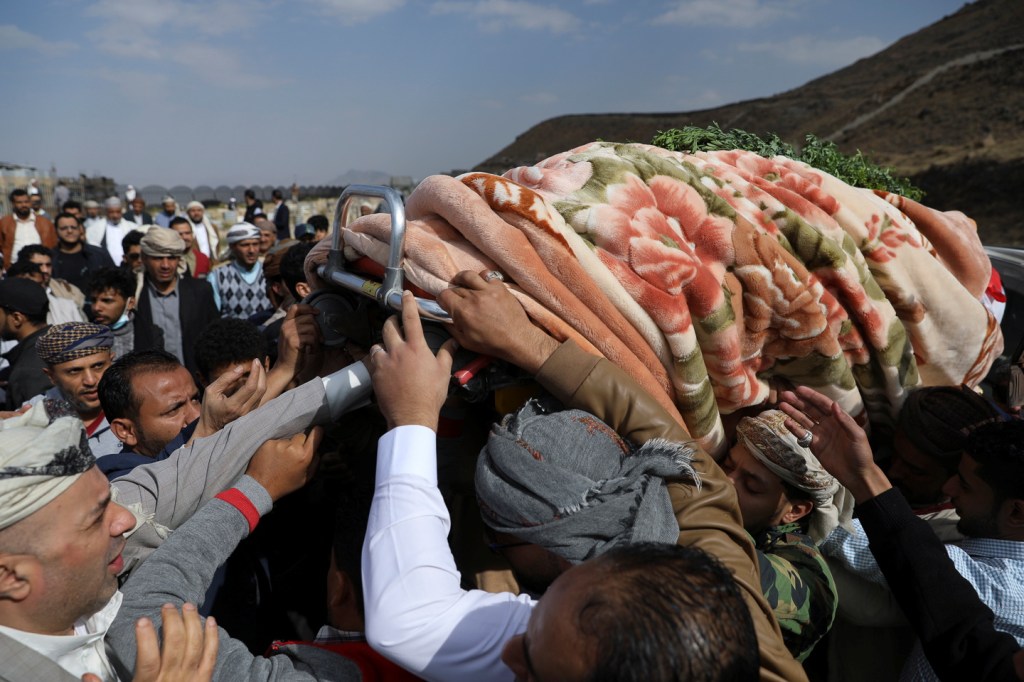On December 1, four journalists were on death row in the Yemeni capital, Sanaa, for the crime of spreading false news.
Before they were detained in 2015, Abdulkhaleq Amran, Akram al-Waleedi, Hareth Hameed, and Tawfiq al-Mansouri worked for various outlets, including the independent Al-Masdar newspaper and outlets associated with al-Islah, one of the parties in Yemen’s fragile coalition government. They were not included in CPJ’s annual prison census, which counts people imprisoned by state authorities for their reporting, because they were jailed by Ansar Allah, the militant group known as the Houthis that for the past seven years has controlled Sanaa and its institutions – including the court that sentenced the four journalists to death in April 2020.
The Houthis have previously followed through on such sentences, prompting an international outcry when a firing squad executed nine men in September 2021. The threat has cast a chill over Sanaa and other parts of Yemen, where dozens of others await execution, including religious minority activists and some of the Houthis’ political opponents.
CPJ documented at least one other journalist detained in Sanaa in 2021, and is still investigating unconfirmed reports of others jailed by the Houthis, but they are not the only group claiming that authority in Yemen. Aden, a southern port city, and other parts of the south are under the control of the separatist Southern Transitional Council. Formed in 2017, the STC aims to restore the independence of South Yemen, which existed as a state prior to Yemen’s reunification in 1990.
Journalists in those areas have previously faced assault and prolonged detention, CPJ has found, particularly for reporting on abuses committed by militias loyal to the STC, such as the Security Belt forces, or for critical reporting on the STC’s military backer, the United Arab Emirates. The STC oppose the Houthis, but also routinely clash with Yemen’s internationally recognized national government and a multinational coalition attempting to broker an end to enduring civil war – a conflict that has led to an estimated 233,000 deaths in what the United Nations says is the world’s worst humanitarian crisis.
CPJ’s email requesting comment from Muhammad Abdelsalam, a spokesperson for the Houthis, was not returned before publication. STC spokesperson Mansour Saleh told CPJ via messenger app that the group respects press freedom and allows critical journalists to operate freely, characterizing allegations of abuse as a campaign to undermine the cause of southern independence.
Yemen offers an example of the implications for journalists when non-state groups establish not only security forces and prisons, but courts and legal proceedings. What results is a parallel system of justice bereft of impartiality, despite some of the trappings of due process, according to those who have worked within such systems or seen them up close. Yet facsimile justice systems offer no accountability, and with non-state actors known for violence filling the gaps left by a crumbling state, crimes against journalists continue with impunity.
Abdel Majeed Farea Sabra, a lawyer for the four journalists on death row, told CPJ that Houthi forces raid and shutter media outlets that they disagree with, so trials – which are closed to the press and other observers – should be seen within the larger context of the group’s hostility towards independent journalists.
“The measures taken by the Houthis against freedom of opinion and expression in general, and the rights of journalists in particular, [are] horrific,” he said. “No authority has carried out measures like these in the Republic of Yemen since the adoption of the constitution [in 1991].”
RELATED COVERAGE: More regional analysis on CPJ’s 2021 data
The situation under the Southern Transitional Council is hardly better. STC forces detained Adel al-Hasani, a journalist and fixer who had extensive contact with the international media, in Aden in September 2020 and held him without charge for nearly half a year. CPJ reported earlier this year that he had been beaten, suspended from the ceiling, and deprived of sleep in custody.
A person familiar with al-Hasani’s case told CPJ that his experience was common in STC-controlled areas, where security forces had sexually assaulted and tortured detainees, and many were being held in undisclosed locations. The person spoke on condition of anonymity for fear of retaliation.
A local NGO, Mwatana for Human Rights, has independently documented numerous cases of torture and abuse in unofficial prisons operated by all of Yemen’s warring forces, and The Associated Press identified sexual torture by Emirati officers or Yemeni guards in at least four prisons in Aden in 2018.
“They are languishing in very bad prisons and are not given any right of defense,” the person said of other detainees in southern Yemen. “There are those who have been there until this moment, for years, without any trial [or] fair procedures.”
STC spokesperson Mansour Saleh told CPJ that all prisons in STC-controlled areas operate according to existing laws.
Aden has also been the site of two recent journalist murders: the June 2020 shooting of Nabil Hasan al-Quaety by men in military uniforms, and the car bomb attack last month that killed Rasha Abdullah al-Harazi and severely injured her husband, Mahmoud al-Atmi. No group claimed responsibility for that attack, which took place the month before the United Nations Human Rights Council failed to renew the mandate of the Group of Eminent Experts, the only independent mechanism on an international level to investigate such abuses.
Saleh said that the STC was investigating al-Harazi’s murder and accused the Yemeni government of shielding those responsible for al-Quaety’s murder.
The killings may never be properly investigated under the country’s patchwork of judicial institutions, particularly given the abuses in Aden’s judicial proceedings highlighted by the person CPJ spoke with.
“Transparency and integrity [do] not exist in the system at all,” they said.
